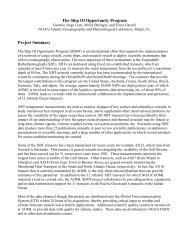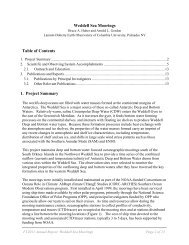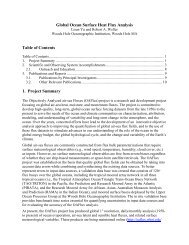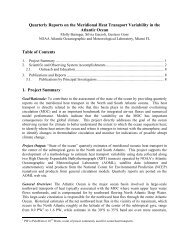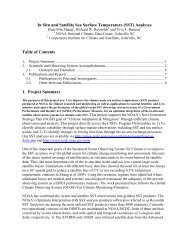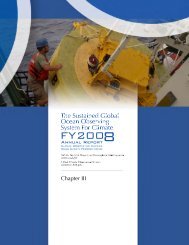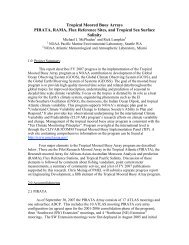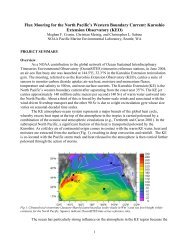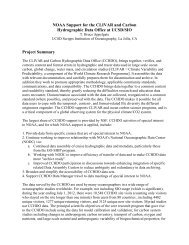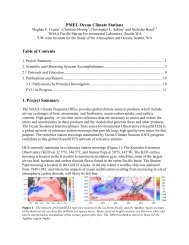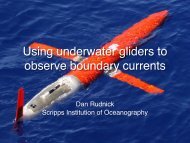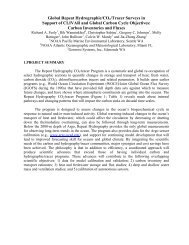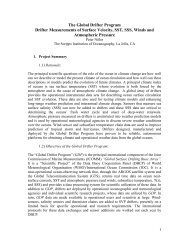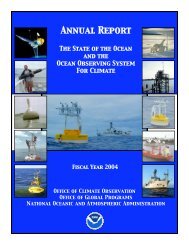GCOS Implementation Plan - WMO
GCOS Implementation Plan - WMO
GCOS Implementation Plan - WMO
You also want an ePaper? Increase the reach of your titles
YUMPU automatically turns print PDFs into web optimized ePapers that Google loves.
<strong>Implementation</strong> <strong>Plan</strong> for the Global Observing System for Climate in Support of the UNFCCC<br />
(2010 Update)<br />
Agents for <strong>Implementation</strong><br />
Appendix 5<br />
Intergovernmental organizations sponsoring component observing systems or activities:<br />
• UNESCO and IOC – geology, Earth surface and ocean observing systems.<br />
• <strong>WMO</strong> – meteorological, hydrological and atmospheric constituent observing systems.<br />
• UNEP – environmental observations.<br />
• FAO – land-surface, land-cover, water-use observations.<br />
• ICSU – research into most observing systems.<br />
National <strong>GCOS</strong> <strong>Implementation</strong> Mechanisms:<br />
• <strong>GCOS</strong> National Coordinators and Coordinating Committees.<br />
• National Meteorological Services (NMSs).<br />
• National Hydrological Services (NHSs).<br />
• National Ocean Services, Research Institutions and Universities.<br />
• National Environmental Agencies.<br />
National agencies sponsoring and operating global satellite observing systems:<br />
• USA, NOAA/NESDIS – Operational meteorological polar orbiting and geostationary satellite<br />
systems.<br />
• USA, NASA – Research and development environmental satellite systems.<br />
• Japan, JMA – Operational meteorological geostationary satellite systems.<br />
• Japan, JAXA – Research and development environmental satellite systems.<br />
• Russian Federation, ROSHYDROMET – Operational meteorological polar orbiting and<br />
geostationary satellite systems.<br />
• Russian Federation, FSA – Research and development environmental satellite systems.<br />
• China, CMA – Operational meteorological polar orbiting and geostationary satellite systems.<br />
• China, CNSA – Research and development of environmental satellite systems.-<br />
• India, ISRO – Research and development environmental satellite systems.<br />
• India, IMD – Operational meteorological geostationary satellite systems.<br />
• France, CNES – Operational polar orbiting satellite systems.<br />
• Germany, DLR – Research and development environmental satellite systems.<br />
• Brazil, INPE - Research and development environmental satellite systems.<br />
• Canada, CSA - Research and development of environmental satellite systems; operational SAR<br />
satellites<br />
Regional and specialized intergovernmental organizations sponsoring and/or operating<br />
component observing or analysis systems:<br />
• EUMETSAT – Operational meteorological geostationary satellite systems and polar orbiting<br />
systems.<br />
• ESA – Research and development environmental satellite systems.<br />
• ECMWF – Integrated global analysis systems.<br />
Intergovernmental Technical Commissions dealing with climate observations:<br />
• <strong>WMO</strong>/IOC Joint Technical Commission for Oceanography and Marine Meteorology (JCOMM) –<br />
Comprehensive Global Ocean Observing System.<br />
• <strong>WMO</strong> Commission for Basic Systems (<strong>WMO</strong> CBS) – Responsible for the World Weather Watch<br />
(WWW) and its components: the Global Observing System (GOS), Global Telecommunication<br />
System (GTS), Global Data Processing and Forecasting System (GDPFS) as well as <strong>WMO</strong><br />
Space Programme.<br />
• <strong>WMO</strong> Commission for Atmospheric Science (<strong>WMO</strong> CAS) – Atmospheric chemistry. Lead<br />
Commission for the Global Atmosphere Watch (GAW).<br />
• <strong>WMO</strong> Commission for Instruments and Methods of Observation (<strong>WMO</strong> CIMO) – Standardisation<br />
and compatibility of instrumentation. Instrumentation inter-comparisons.<br />
• <strong>WMO</strong> Commission for Hydrology (<strong>WMO</strong> CHy) – Operational hydrology including observing<br />
networks, collection, processing, archiving and retrieval of hydrological data. Standardisation of<br />
methods, procedures and techniques.<br />
144



